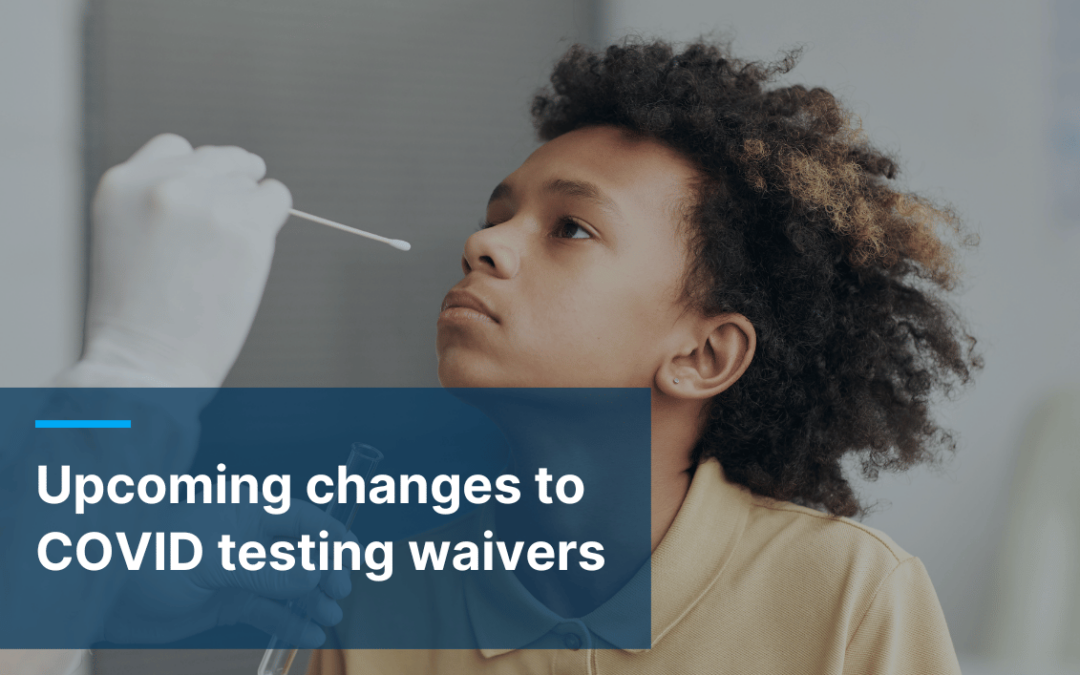A number of key waivers put in place at the beginning of the COVID-19 Public Health Emergency to facilitate widespread testing will end when the emergency declaration expires on May 11, according to recent updates from CMS.
While labs and providers performing COVID testing have long anticipated the expiration of these flexibilities, it’s still crucial they understand how their billing and administrative practices that have become commonplace during the past two-plus years must be amended to ensure their testing continues to be reimbursed and compliant.
Below is a rundown of the major changes labs should be aware of. Please note, these apply only to Medicare and Medicaid. A full breakdown of waiver changes, including those that will remain intact, may be viewed here: FAQ: CMS COVID testing waiver changes (PDF)
No additional reimbursement for high-throughput testing
Early in the PHE, CMS established a rule allowing providers to bill U0003, and U0004 for an additional payment when performing high-throughput testing. High-throughput lab tests can process more than two hundred specimens a day using highly sophisticated equipment that requires specially trained technicians and more time-intensive processes to assure quality.
Later on, U0005 was added to as a separate payment to providers who returned the majority of their test results in a month within 48 hours. Following the expiration of the PHE, all three codes will no longer be payable and rates for testing will revert to those listed in the Clinical Lab Fee Schedule (CLFS).
Price transparency for COVID tests
In an interim final rule released in late 2020, CMS established that any provider offering a COVID diagnostic test must publicly list the cash price of their test on their website or in writing on a sign posted prominently at any location testing is performed. Those who failed to comply with this requirement were subject to fines of up to $300/day.
Following the expiration of the PHE, this special price transparency requirement will end.
Increased fees for home specimen collection
During the PHE, the nominal specimen collection fee for COVID testing for homebound and non-hospital inpatients was bumped to $23.46. Additionally, samples collected from individuals in a non-covered stay in a skilled nursing facility, or on behalf of an HHA, were reimbursed at $25.46. These payment amounts, billed under HCPCS codes G2023 and G2024, will end at the termination of the PHE.
Requiring a physician’s order for testing
During the initial phases of the PHE, CMS stated COVID tests would be covered for Medicare and Medicaid beneficiaries without a provider’s order to ensure the barrier to testing was sufficiently low. That policy was later revised to state only a beneficiaries first test would be covered without an order to help limit potential overutilization or fraud and abuse. Following the end of the PHE, CMS will resume requiring a physician or non-physician practitioner’s order for all testing related to COVID-19.
However, CMS still requires laboratories to furnish the results of COVID tests to the beneficiary. Consistent and regular reporting of all testing results to local officials is also expected to continue, typically within 24 hours of the lab receiving results.
Antibody (serology) tests
Coverage for antibody COVID tests will be covered under the individual discretion of each Medicare Administrative Contractor (MAC).
Stark Law flexibilities
A number of blanket waivers to physician self-referral laws (Stark Law) were waived early during the PHE to allow for limited remuneration and self-referrals for services strictly related to COVID testing. Once the PHE ends, labs and physicians must again comply with all provisions under Stark Law.
CLIA guidance
Below is a CMS summary of the agency’s expectations surrounding CLIA guidance issued during the PHE.
- CMS exercised enforcement discretion to facilitate pathologists’ ability to review pathology slides remotely without the need for a separate CLIA certificate for the remote location. Enforcement discretion is not contingent on PHE authority; CMS will continue to exercise enforcement discretion that allows pathologists to examine digital images and laboratory data at remote locations.
- CMS expedited CLIA certificate application review and processing to facilitate widespread testing during the PHE. CMS determined that at the end of the PHE, CMS will continue to allow expedited lab certification by allowing a laboratory to begin testing as soon as they receive a CLIA number and pay the laboratory fee.
- CMS allowed laboratories within a hospital/university hospital campus to hold a single certificate for the laboratory sites within the same physical location or street address. At the end of the PHE, regulations will allow CMS to continue to allow for labs within a hospital to hold a single certificate for the laboratory sites within the same physical location or street address.
- CMS clarified that alternate specimen collection devices and media may be used to collect and transport COVID-19 samples. At the end of the PHE, regulations will allow CMS to continue to use alternate specimen collection devices and media. Under existing regulations, Laboratories must either follow the manufacturer’s instructions or establish performance specifications for a modified procedure.
Responding to these changes
Keep in mind these changes and waiver expirations only apply to Medicare and Medicaid beneficiaries, so labs continuing to perform COVID testing will want to ensure they understand how private payers are adapting their rules as well.
If you need assistance reviewing your COVID testing practices to ensure you will be in compliance when the PHE expires, don’t hesitate to reach out to us for a free consultation.
